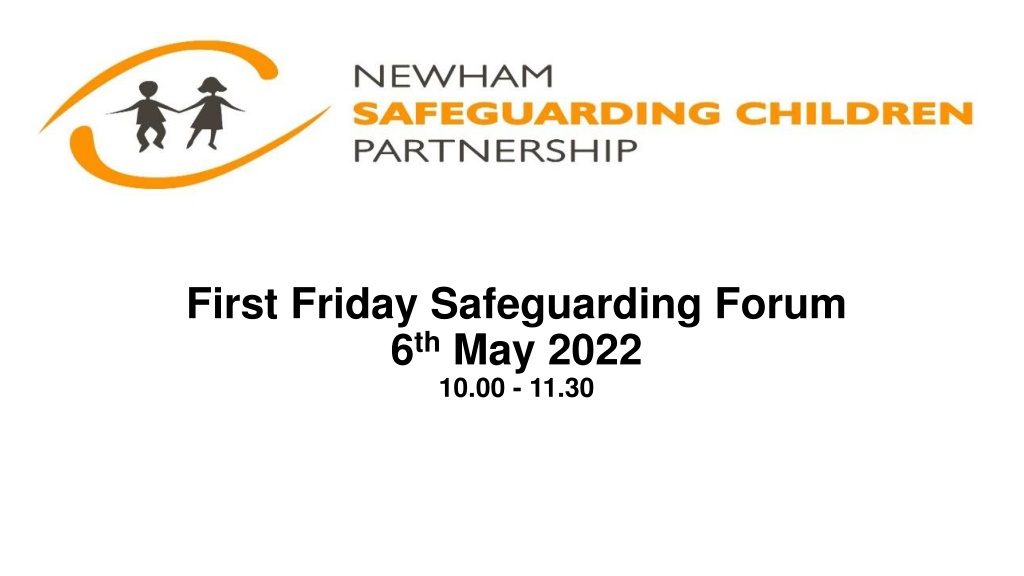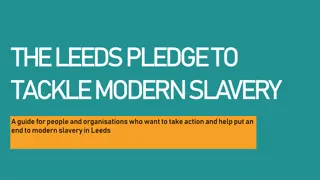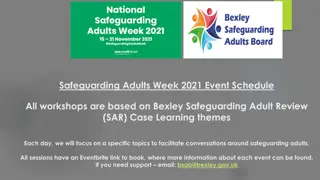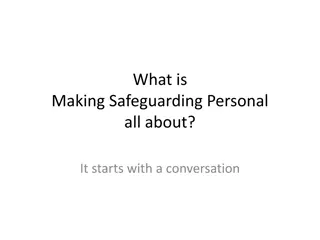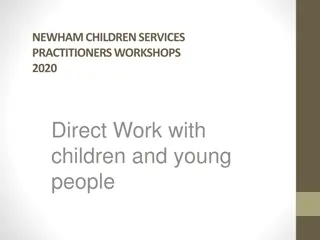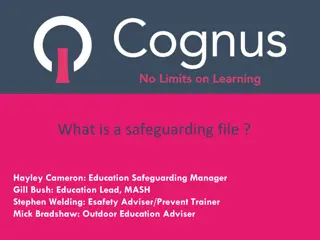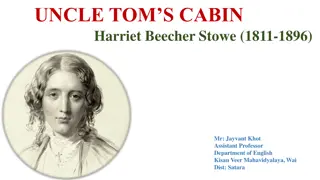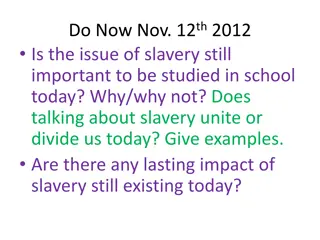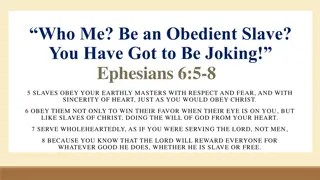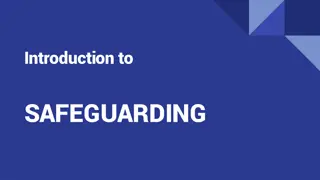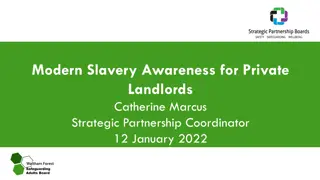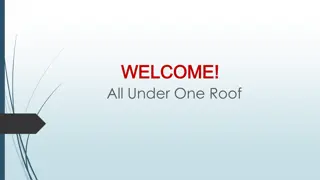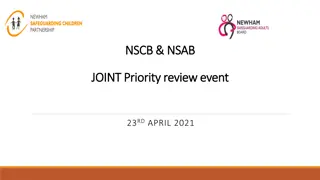Safeguarding Forum on Modern Day Slavery in Newham - May 6th, 2022
The Safeguarding Forum scheduled for May 6th, 2022, in Newham focuses on modern-day slavery, featuring discussions on strategies, action plans, and a zero-tolerance approach. The event includes insights from key speakers, updates on education safeguarding, and pathways for help and support for children and families. Learn about identifying, interrupting, and tackling modern slavery, a grave violation of human rights that often goes unnoticed in communities.
Download Presentation

Please find below an Image/Link to download the presentation.
The content on the website is provided AS IS for your information and personal use only. It may not be sold, licensed, or shared on other websites without obtaining consent from the author. Download presentation by click this link. If you encounter any issues during the download, it is possible that the publisher has removed the file from their server.
E N D
Presentation Transcript
First Friday Safeguarding Forum 6thMay 2022 10.00 - 11.30
10.00 Natalie Newton NSPC Business Manager Welcome and Introduction Standing items 7 min Briefing Update Action Plan reminder Live Sign Up Recap from last month Newham s response to Child Q opportunity for Q&A 10:15 Louise OConnor Education Safeguarding Lead, Education, Inclusion & Achievement Natalie Newton NSCP Business Manager 10.30 LBN Modern Day Slavery Strategy and Action Plan & Video 10:50 All Q & A 10:55 Video 7 minute Briefing Ellie & QA 11:15 Newham s Help and Support Pathways for Children and Families Q & A Mahfuzul Khan Head of Service for MASH, EDT, NRPF, Assessment & Families First Services Children's Social Care 11:25 Closing Remarks
NSCP Website Demo 7 min Briefing Update Action Plan reminder Live Sign Up Recap from last month Natalie Newton NSCP Business Manager
Newhams Modern Day Slavery Newham s Modern Day Slavery Strategy and Action Plan Strategy and Action Plan Gary Connors; Assistant Director of Community Safety,
Zero Tolerance for Modern Day Slavery in Newham Our ambition for Newham is for it to be a place where Modern Slavery does not take place. Where all Council services and partners work tirelessly to identify, interrupt and tackle the root causes of the circumstances and conditions where Modern Day Slavery can develop and take hold. Where staff are empowered to act upon any suspicions and residents are able to identify where it is taking place and take the opportunity to report it. Where victims are supported and not criminalised. Where we expose it taking place often in plain sight in Newham. This Strategy sets out the LBN approach to tackling Modern Day Slavery and the duties under the Modern Slavery Act 2015
What is it? Modern slavery is an umbrella term encompassing slavery, servitude, forced or compulsory labour and human trafficking. Victims of modern slavery are unable to leave their situation of exploitation, controlled by threats, punishment, violence, coercion and deception. Slavery violates human rights, denying people their right to life, freedom and security. It is hidden in plain sight and many of us will have unknowingly seen the victims, perpetrators or effects of slavery in our day-to-day life. It often involves multiple victims, offenders and locations making modern slavery difficult to identify.
Common types of exploitation Sexual exploitation Child sexual exploitation - group exploitation Child sexual exploitation - single exploitation Forced sex work in fixed location Forced sex work in changing location Trafficking for personal gratification Domestic servitude Exploited by partner Exploited by relatives Exploiter/s not related Criminal exploitation Forced gang-related criminality Forced labour in illegal activities Forced into acquisitive crime Forced begging Forced to commit fraud(benefit fraud) . .Labour exploitation Victims exploited for multiple purposes in isolated environments Victims work for offenders Victims work for someone other than offender .
What are the signs? What are the signs? Physical Appearance Victims may often be hungry, look scruffy, may be exhausted, sometimes drugged or drunk and have incorrect clothing or equipment for the job. Psychological Trauma Victims may be fearful or scared, anxious or stressed, angry or agitated, withdrawn, traumatized, confused, unable to make themselves understood. Isolation Victims may be withdrawn to communicate effectively, unable to understand you or speak English, having someone else speak on their behalf. Poor living conditions Victims living where they work or living in overcrowded houses. They may live in a caravan or outbuilding. They may live in places with blacked-out windows or have no running water. Restricted Freedom Victims may be unable to come and go freely, unable to show their passport or open bank account. They may be in debt, they may also be placed where doors are locked on the outside, show no desire to leave their situation, fearful of authority and fearful of reprisals. Often unable to prove they have legal status to be in the UK.
https://www.youtube.com/watc h?v=Jv1H_fAoOG4 Modern Slavery is closer than you think: Understanding Modern Slavery and Human Trafficking
Newhams Partnership Newham s Partnership Response Response All age exploitation - joint with Newham Safeguarding Adults Board We will co-ordinate and drive forward multi-agency programmes and interventions in Newham which combat exploitation in all its forms e.g. financial abuse, modern slavery, sexual exploitation, criminal exploitation, radicalisation. By raising awareness and making the borough a safer place to live.
Newham Modern Day Slavery Task and Finish/Co-ordination Group; Chaired by Gary Connors; Assistant Director of Community Safety, Terms of Reference To provide co-ordination and oversight for Newham s collective response to Modern Day Slavery To monitor progress of the delivery of the Modern Day Slavery Action Plan and ensure that its work streams are being progressed to improve the local response to Modern Day Slavery To receive feedback from local and regional networks on Modern Day Slavery including the London Modern Slavery Leads and their sub-groups
To improve the collective understanding of the Modern Day Slavery landscape in Newham and the quality of the response to support victims. Lead area of work will be All Age Exploitation Group for review after 6 months. Standing agenda item at AAE. 6 month review deep dive into an identified area of practice. Governance Joint SAB & NSCP and CSP and where appropriate H&WB Coordinating the champions; Identify SPOCS across the partnership those who have been trained are they rolling out the training? Are the right people identified? Data Analysis GC will support in this area re an officer Quality Assurance and learning to be included and considered
Modern Day Slavery Modern Day Slavery Newham Action Plan 2021 Action Plan 2021- -23 Newham 23 Theme s 36 Areas of Focus
Increase awareness of Modern Day Slavery across Newham Training for all Commissioning and Procurement Working together in partnership Focusing on Prevention and Intervention Governance and co-ordination
Forward Plan Forward Plan The Task & Finish Group is scheduled to run up to September /October 2022. A plan t o recruit an officer to support the action plan and monitor progress via the Community Safety Service. There will be a relaunch of the Strategy at the Adolescent Exploitation Conference Event to promote the MDS Strategy and Action Plan progress
National & Newham Referral Mechanisms & Links
What the National Referral Mechanism is The National Referral Mechanism (NRM) is a framework for identifying and referring potential victims of modern slavery and ensuring they receive the appropriate support. The LA are listed as a first responder who are able to make referrals alongside a list of other agencies such as police. Child victims If the potential victim is under 18, or may be under 18, an NRM referral must be made children cannot be referred in using a DtN referral. Child victims do not have to consent to be referred into the NRM and must first be safeguarded and then referred into the NRM process.
How can I report Modern Day Slavery? If something doesn't seem right, trust your instinct. Follow Newham's Referral Mechanisms Report it. 0300 303 8151 (The Salvation Army's 24/7, confidential referral line) 999 Call the police if you think someone is in immediate danger
Useful Links For further information regarding modern slavery, visit www.hestia.org/modernslaveryresponse https://www.newham.gov.uk/health-adult-social-care/safeguarding-resources- professionals/5 https://www.newham.gov.uk/downloads/file/2055/07239-newham- preventionofmodernslaveryprocessmap1920 https://www.gov.uk/government/publications/human-trafficking-victims- referral-and-assessment-forms/guidance-on-the-national-referral-mechanism- for-potential-adult-victims-of-modern-slavery-england-and-wales
Training Available via NSCP Child Sexual Abuse, and Harmful Sexual Behaviour 23.06.2022 Complex and Contextual Safeguarding 07.06.2022 Criminal Exploitation 18.05.2022 & 13.07.2022 Digital Safeguarding 24.05.2022 Healthy Relationships & Online Sexual Content 07.06.2022 Safeguarding Children Living away from Home 28.06.2022
CONTINUED Trauma Informed Practice 10 & 11 /05/2022 Working with Young Women and Girls Affected by Gangs and County Lines 17.05.2022 https://www.newhamscp.org.uk/learning-zone/
Refreshing Newhams Threshold Guidance Refreshing Newham s Threshold Guidance Mahfuzul Khan Head of Service (Multi-Agency Safeguarding Hub & Ass), Operations & Safeguarding
Refreshing Newhams Threshold Guidance Summary from engagement sessions
Our approach to designing the threshold document and early help strategy During Jan to March 2022, partners across Newham have been engaged in workshops to support us to develop our current threshold guidance and to inform how we can best provide help and support for children and families. Partners engaged included: Early Help Targeted Services Health professionals 0-19 Therapy services Police Designated Safeguarding Leads Head teachers Children s Social Care MASH Steering group Over 100 professionals have contributed their reflections and provided direction for the revised threshold guidance.
Engagement Sessions key learning and feedback on current document How many times have you used the Threshold guidance in the last 2 weeks? The current help and support (threshold) document is poorly used, on average 81% of respondents said they had not used our threshold document in the last few weeks with most agreeing they had never used it and wouldn t know where to find it. 120% 0% 0% 100% 0% 0% 4% 0% 0% 0% 5% Respondent who had used it found the continuum of need charts and diagrams the most helpful. They wanted a one page chart they could use in their setting. 13% 14% 14% 80% 14% 14% Our support offer for children with SEND is insufficiently developed and defined at tiers 1 and 2, parental feedback showed there was a need to separate access to short breaks from safeguarding processes where possible and ensure there is alignment between the SEND Panel dealing with EHCP requests and MASH. Percentage 14% 60% 96% 95% 88% 40% 71% 57% Early Help Services are broadly operating across tier 2 and tier 3 needs, we need to be clear where the LA will act as the lead professional and where partners will be expected to do so. 20% 0% Partners were most interested in needs they come across frequently such as; domestic abuse, exploitation, neglect and SEND but they also wanted to ensure that other needs such as bullying, behavioural challenges and child on parent violence amongst others were referenced in our guidance. MASH EPB DSL Targeted EH 0-19 Health Professinal Group None 1 to 2 3 to 4 5+
Key Recommendations A suggested programme structure is outlined later on in the pack but the overall recommendations should be considered in driving the programme forward: 1. Simplified Help and Support Chart to support partners in day to day decision-making around need and risk 2. Strengthened communication with refers and partners using a clear format that supports a coaching model , using a feedback template following referrals which balances GDPR restrictions with clear messages around next steps, where to find further support services & tailored signposting e.g direct links to Local Offer website, family Information Service and Journey of the Child 3. Increasing capacity building opportunities enabled through increased opportunities for case discussions with targeted early help or social work professionals within the MASH, supporting the embedding of Newham s practice model- this could include group supervision within the community and greater promotion of the existing MASH consultation line and EH co-ordination panel. Professional toolkit- direct work 4. Fully embed the TAF framework to support step up and step down processes providing clear expectations and information on need/risk to the child, interventions delivered to date and any further support required before a family are stepped up or down 5. Single referral pathway for LA run Early Help Services including Youth Empowerment Services, Targeted EH, CC and PECEHH 6. A review of pathways for high volume needs not requiring a safeguarding intervention particularly relating to high demand areas such as housing
Our revised threshold guidance -Single one page threshold chart that can be extracted and printed encouraging use of the MASH consultation line -Overview of our CYP plan outcomes and practice framework -Dedicated sections on prominent needs facing children and families in Newham: SEND Domestic Abuse Neglect Exploitation -Clear flowcharts to outline step down processes for targeted and intensive early help services -Guidance on information-sharing -Links to information and support services
